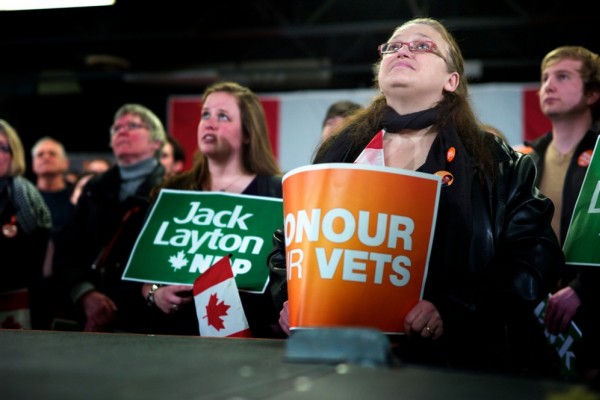The Waffle at 50
“Left nationalism, progressive nationalism, was, and is, what the world needs. In that sense the Waffle was indeed prescient”

Mel Watkins, a founder of the “Waffle”, the best-known name for the movement within the NDP that produced the Manifesto for an Independent Socialist Canada.
In the late 1960s and early 1970s, the Waffle was my preoccupation and my pleasure. It was a key moment of my political education. I would not have realized until I wrote this that the Waffle remains so relevant to understanding our world today.
I am delighted that the Waffle is being remembered and thereby lives on. It is fitting that this is happening in Canadian Dimension since the Waffle Manifesto (also known as the Manifesto for an Independent Socialist Canada) was first published here 50 years ago.
Permit me to begin by mourning the passing of Jim Laxer in February of last year. He was the author of the first draft of the Manifesto, and when Tommy Douglas stepped down as federal NDP leader in 1971, Laxer, as the Waffle’s candidate, ran second in four ballots in the leadership race, taking close to 40 percent at the end (David Lewis was the eventual winner). It was an incredible achievement by someone not yet 30 and still a graduate student.
The Canadian Oxford Dictionary gives an excellent description of the Waffle:
A caucus of NDP members organized in 1969 to promote a socialist and nationalist agenda, which included the replacement of US private ownership of Canadian industry with Canadian public ownership, the establishment of an independent Canadian labour movement, the right of Québec to self-determination, and the advancement of the feminist movement.
An impressive list, to which we can add Waffle support on the picket lines in nasty strikes where one risked arrest, and the central importance of Waffle thinking to the emergence in the 1970s of the New Canadian Political Economy.
But the Waffle was not prescient about what were then emerging issues: the environment, the rights of Indigenous peoples, and LGBTQ rights. We should have done better.
A significant feature of the Waffle as a left formation was its emphasis on the national question. Fifty years ago, that meant Canada reducing its dependence on the United States, notably the domination of Canadian firms by American ownership.
American imperialism was particularly evident in the 1960s in the Vietnam War. Canadian nationalism, Waffle-style, was at its heart anti-imperialist. The Waffle labelled itself the Movement for an Independent Socialist Canada (MISC).
In retrospect, there was a space for nationalist politics in the late 1960s and early 1970s, but it was severely constrained by the subsequent breakdown of the Keynesian consensus nationally and internationally, and the transition that followed to corporate globalization and neoliberalism.
With the passage of time, it is evident that Canada itself is an empire; consider its colonization of Indigenous peoples and the extension of its corporate capitalism abroad (most notably mining) with its disregard for human rights.
Pushed aside at one time by the flood of globalization, left nationalism would seem to have a fresh relevance today, as globalization falters and nativist, isolationist politics flourish and countries are forced to restructure their global connections. There are openings for the left.
Meanwhile, the gathering economic and social crises have undermined the legitimacy of mainstream politics and led to the resurgence of the right. The so-called alt-right reeks of white supremacy and reduces nationalism to the ethnic and the racist.
The Harvard economist Dani Rodrik has dissented from mainstream economic theory by questioning the worth of trade agreements designed to serve corporate interests, of profit over human rights and the protection of the environment. Most recently he has written that we must “save nationalism from the fascists.”
Rodrik is keenly aware of the difficulty in defending nationalism. “Nationalism is one of those words that evokes a knee-jerk, invariably negative response in polite company,” he writes. The situation is only worsened when Trump calls himself a nationalist and some listeners think that warrants no tolerance for left nationalism. The Israeli politician and political analyst Yael Tamir, in her new book Why Nationalism (with a foreword by Rodrik), writes “the tendency to identify nationalism solely with reactionary views, overlooking its modernizing and liberating powers, represents a deep misunderstanding of the modern world.”
In the past 50 years, nationalism has had a variety of manifestations, from the Québec independentist movement, to Indigenous peoples naming themselves First Nations, to multiculturalism becoming the essence of Canadian national identity.

At the turn of the millenium, the American scholar Leah Greenfeld argued convincingly that Max Weber’s “spirit of capitalism” has not been invention or innovation or entrepreneurship, but nationalism.
Here at home, we have Frank Cunningham, building on C.B. Macpherson, insisting on the necessity of defending global autonomy in the face of globalization to permit the emergence of an egalitarian and truly democratic society. And from the 1960s, Abraham Rotstein, building on Karl Polanyi, calling for a nationalist counter-movement to control multinational corporations.
The renowned Marxist historian Eric Hobsbawm, not withstanding his deep dislike of nationalism, asserted that “its enormous force… must be harnessed for progress if possible… We cannot let the right have the monopoly of the flag.”
The Waffle, a product of the sixties, didn’t last. Operating within the NDP, its explosion reflected the media’s love of intra-party conflict. Within three years came its implosion and expulsion. We were too weak to win over the NDP, but too strong to be tolerated by its leadership.
The Waffle manifesto began its life as a resolution to be taken to the NDP federal election in the fall of 1969. It was not anticipated that the resolution, while not passing, would do as well as it did. Waffle supporters left the convention with no alternative but to continue to exist. We were branded a party within the party and ordered to disband, which we refused to do and left the NDP. There were some efforts made by some members of the party to find a compromise, but David Lewis, the power within the NDP, was not interested.
The Waffle itself, as an outspoken ideological entity, was unwilling—unable really—to offer any concessions.
Outside the NDP the Waffle organized a very successful lecture series on contemporary Canadian issues which was published as a book titled (Canada) Ltd. The Waffle as MISC ran a few candidates in the federal election of 1974, lost miserably, and folded its tent.
But left nationalism, progressive nationalism, was, and is, what the world needs. In that sense the Waffle was indeed prescient.
On the occasion of the Waffle’s 25th anniversary, I cited the Council of Canadians headed by Maude Barlow as its worthy successor. Now, on its 50th anniversary, the issue that didn’t exist in terms of mass consciousness in the 1960s, is climate change. There has been for some time Greenpeace and the David Suzuki Foundation and the Green Party. Now there is the Leap Manifesto and, in partisan politics, the Greens—which just tripled its federal MPs, from one to three.
Trudeau’s wishy-washy policy on the tar sands takes the Liberals out of the competition. The Conservatives have willingly bogged themselves down in those tar sands. The NDP has to demonstrate its commitment. The Waffle talked about what was then called extra-parliamentary politics. Now it is the social movements that can set the pace.
The most recent happening is the call for a Canadian Green New Deal. That’s progressive nationalism indeed, willing to be associated with the American variant—the New Deal of the past and its proposed Green-ing in the present, wanting and working to escape from the Canadian staples trap of fossil fuels and thereby from the planet’s carbon trap.
Mel Watkins is a Canadian political economist and activist. He is professor emeritus of economics and political science at the University of Toronto.










